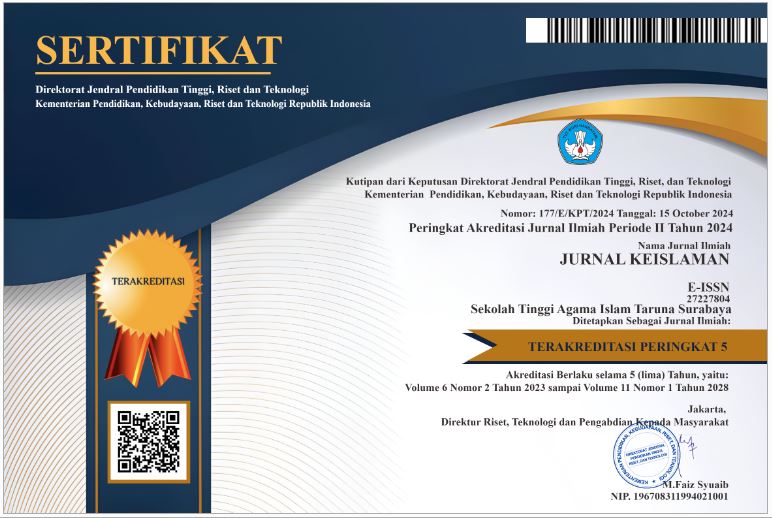Kajian Psikologis terhadap Pengaruh Pandangan Islam dalam Pembentukan Sikap dan Perilaku LGBT : Studi Kasus Pesta Seks 56 Gay di Jakarta Selatan
DOI:
https://doi.org/10.54298/jk.v8i1.383Keywords:
LGBT, Islam, Psychology, Social Stigma, Social MediaAbstract
The LGBT (Lesbian, Gay, Bisexual, and Transgender) phenomenon has become a controversial global issue, including in Indonesia, where social and religious norms play a major role in shaping people's attitudes. Within the Islamic context, the LGBT community is regarded as being in opposition to human nature and the tenets of sharia law, leading to its frequent rejection. From a psychological perspective, individuals who identify as LGBT face mental distress, anxiety, and identity conflict due to social stigma. This research aims to analyze the influence of Islamic views in shaping attitudes towards LGBT and to examine the psychological impact of social marginalization, with a case study of the "56 Gay Sex Party" in South Jakarta. The research employed a qualitative approach, incorporating a literature review, social media analysis, and a Likert scale survey of religious leaders and the general public. The results indicated that 83.3% of respondents exhibited a negative stance towards LGBT individuals, with religion being the predominant factor influencing their attitudes. Moreover, a significant proportion of religious leaders, 85.7%, firmly asserted the pivotal role of Islamic teachings in shaping attitudes toward LGBT individuals. From a psychological standpoint, individuals who identify as LGBT frequently encounter identity conflict and emotional distress, which, in some cases, is influenced by factors such as parenting, trauma, or emotional escapism. Furthermore, 66.7% of respondents expressed the opinion that the LGBT community is growing, particularly through the medium of social media, which has emerged as a platform for advocacy and debate.
Downloads
References
Amalif, Aditya Rifkian, dan Mira Sekar Arumi. “Pengaruh Perceived Discrimination terhadap Psychological Well-Being dengan Self-Esteem sebagai Mediator: Studi terhadap Pekerja dengan Preferensi Seksual LGBT di DKI Jakarta.” Jurnal Ilmiah Psikologi MIND SET 13, no. 02 (12 Desember 2022): 142–57. https://doi.org/10.35814/MINDSET.V13I02.3823.
Harahap, Rustam D K A. “LGBT di Indonesia: Perspektif hukum Islam, HAM, psikologi dan pendekatan maṣlaḥah.” Al-Ahkam, 2016, 223–48.
Mentari Noor’aini, Audy, dan Chazizah Gusnita. “Analisis Labelling Terhadap Kelompok Lesbian, Gay, Biseksual, Transgender (LGBT) dalam Lingkungan Sosial Masyarakat.” Vol. 3, 2021.
Mukhid, Abd. “Kajian Teoritis Tentang Perilaku Lesbian, Gay, Biseksual, Transgender (Lgbt) Dalam Perspektif Psikologis Dan Teologis.” Sophist: Jurnal Sosial Politik Kajian Islam dan Tafsir 1, no. 1 (2018): 53–75.
Nafisah, Latifatun. “Isu LGBT perspektif Al-Qur’an dan psikologi dan cara pengentasannya.” An-Nida’ 45, no. 2 (2021): 206–24.
Phoebe, Gabriele Rinda, Deni Agus Wicaksono, dan Lukas Keanu Marthapradipta. “Eksistensi LGBT dalam Media Sosial di Dunia Digital.” Prosiding Seminar Nasional Ilmu Ilmu Sosial (SNIIS) 3 (31 Desember 2024): 151–59. https://proceeding.unesa.ac.id/index.php/sniis/article/view/3954.
Prasetyo, Dana Dwi, dan Amsal Amri. “Peranan UP3AI Unsyiah Dalam Mengantisipasi Pengaruh Pemberitaan LGBT (Lesbian,Gay,Biseksual,Transgender) di Media Online Terhadap Mahasiswa.” Jurnal Ilmiah Mahasiswa Fakultas Ilmu Sosial & Ilmu Politik 2, no. 3 (3 Oktober 2017). https://jim.usk.ac.id/FISIP/article/view/3668.
Putri, Destashya Wisna Diraya. “LGBT dalam kajian hak asasi manusia di Indonesia.” Ikatan Penulis Mahasiswa Hukum Indonesia Law Journal 2, no. 1 (2022): 88–100.
Rahmah, Hardiyanti, Devi Amalia, dan Hamidah Hamidah. “Fenomena LGBT Menurut Pandangan Psikologi, Sosial dan Agama.” INTEGRASI : Jurnal Ilmiah Keagamaan dan Kemasyarakatan 1, no. 02 (31 Desember 2023): 110–20. https://www.husin.id/index.php/integrasi/article/view/87.
Riswanto, Dody. “INTERVENSI KONSELING ISLAM UNTUK MENANGGULANGI PERILAKU LGBT PESERTA DIDIK SEKOLAH.” Kaffah: Jurnal Pendidikan dan Sosio Keagamaan 3, no. 2 (2024): 184–91.
Rois, Choirur, dan Ahmad Zainuri. “TINJAUAN FIQHUL HADHOROH TERHADAP PENCEGAHAN LGBT:(Studi Kritis Terhadap Fenomena Upaya Kampanye LGBT di Media Sosial).” Al-Usariyah: Jurnal Hukum Keluarga Islam 1, no. 1 (2023): 33–55.
Saradifa, Azkya, Elfa Aulia Siregar, Ijasmin Ijasmin, Sulastri Zendrato, and Syaqinah Siregar. "Tanggapan Mahasiswa Muslim Universitas Negeri Medan Terhadap Peningkatan Representasi LGBT Dalam Media Populer." Journal of Education Religion Humanities and Multidiciplinary 2, no. 2 (2024): 992-999.
Setyawan, Jefri, dan Syurawasti Muhiddin. “Antara Penolakan dan Penerimaan: Eksplorasi Sikap dan Persepsi Orang Muda terhadap LGBT+ di Indonesia.” Gadjah Mada Journal of Psychology (GamaJoP) 9, no. 1 (17 Mei 2023): 123. https://doi.org/10.22146/GAMAJOP.57192.
Yansyah, Roby, dan Rahayu Rahayu. “GLOBALISASI LESBIAN, GAY, BISEKSUAL, DAN TRANSGENDER (LGBT): PERSPEKTIF HAM DAN AGAMA DALAM LINGKUP HUKUM DI INDONESIA.” LAW REFORM 14, no. 1 (29 Maret 2018): 132–46. https://doi.org/10.14710/LR.V14I1.20242.
Downloads
Published
How to Cite
Issue
Section
License
Copyright (c) 2025 Leni Nurhafidah, Fadilah Nurfalah, Mochamad Ilham Abdillah, Salvia Nasywa Prabawa, Hisny Fajrussalam

This work is licensed under a Creative Commons Attribution-ShareAlike 4.0 International License.
Authors who publish with this journal agree to the following terms:
- Authors retain copyright and grant the journal right of first publication with the work simultaneously licensed under a Creative Commons Attribution-ShareAlike 4.0 that allows others to share the work with an acknowledgement of the work's authorship and initial publication in this journal.
- Authors are able to enter into separate, additional contractual arrangements for the non-exclusive distribution of the journal's published version of the work (e.g., post it to an institutional repository or publish it in a book), with an acknowledgement of its initial publication in this journal.
- Authors are permitted and encouraged to post their work online (e.g., in institutional repositories or on their website) prior to and during the submission process, as it can lead to productive exchanges, as well as earlier and greater citation of published work (See The Effect of Open Access).


















